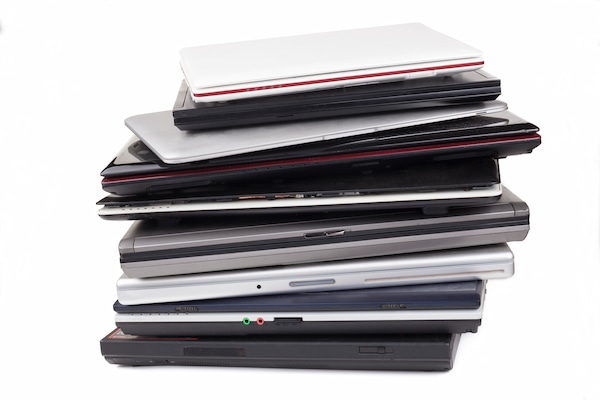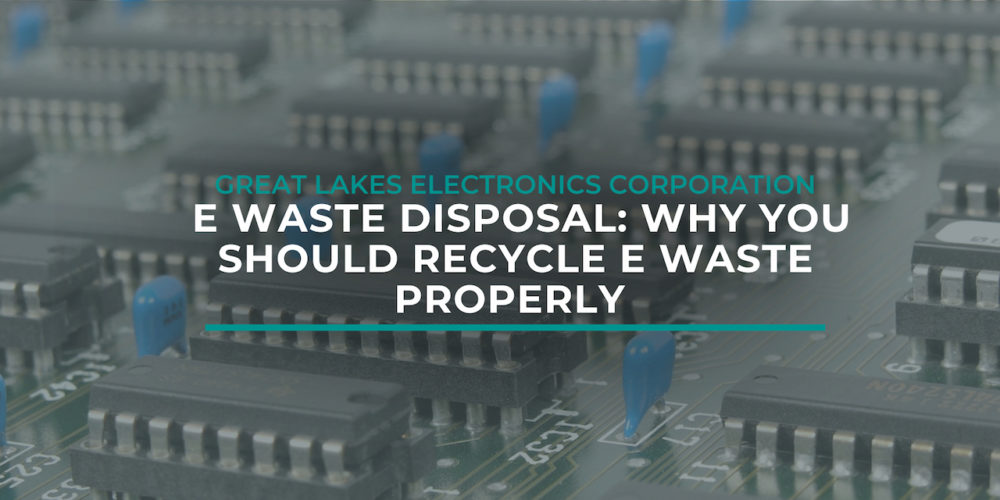Raise your hand if you’ve ever experienced this scenario: your electronics have reached the end of their life, and it’s time to purchase new software. What do you do with the old electronics? More often than not, people tend to throw electronics in the trash as a means of e waste disposal.
Unfortunately, electronic waste can’t just be taken to the dump for 2 reasons:
- It’s not environmentally friendly: old hardware contains components which are extremely harmful to the environment
- It puts your corporate security at risk: those old devices contain sensitive data which leave you vulnerable to hacks
So, what’s the answer to these e waste disposal problems?
In this article, we’ll explain why it’s a more environmentally-friendly and secure option to recycle your electronic waste and how you can properly dispose of it.
E Waste Disposal: The Environmental Impact
Most hardware around the world is made up of 2 main components:
- Plastics
- Metals
Here’s the hard truth: when electronics are thrown into landfills, both plastics and metals breakdown in ways that can hurt the environment around them. This includes the water, earth, plants, and animals around them.
Let’s take a closer look at the negative effects of improper e waste disposal.
E Waste Plastic Effects

First, plastics are a major environmental concern because they don’t break down the way other materials do. When they degrade, they become microplastic particles.
Sadly, microplastic particles are harmful to plants, animals, and fish. Humans consume all of those food sources, meaning that we’re ingesting microplastics, too.
Scientists have reported evidence of microplastics in the digestive systems of fish, even fish that humans consume. They’re not sure what the effect of microplastics will be on humans yet, given as humans eat these fish, but scientists are not optimistic.
E Waste Metals Effects

Next, there are a number of office hardware products that are simply tossed away in the dumpster each year, including:
- Computers
- Servers
- Wires
- Smartphones
Almost all of these products contain metals. When those metals sit in landfills without being recycled, they oxidize and ionize in the soil (meaning they’re affected by oxygen and they break down).
Metals in e waste disposal hardware like lead, cadmium, and mercury contain toxic chemicals which are released when they break down. Here’s the worst news: all of these are hazardous metals to human health.
Toxic E Waste Chemicals Seep Into Drinking Water

Through improper e waste disposal, these metals can leach into the soil and groundwater. In fact, local groundwater can even turn poisonous if those chemicals leach into it in sufficient quantities.
So, how do we solve the environmental problems of this e waste disposal dilemma?
Here’s the good news: the environmental impact of hardware disposal could be mitigated if companies used a reputable e waste disposal facility, such as Great Lakes Electronics Corporation. Therefore, electronics will be recycled in a protected, environmentally-friendly method.
Keep reading to learn how Great Lakes Electronics Corporation can dispose of your electronics and save your valuable IT assets as well.
E Waste Security Risk of Disposing Old IT Assets

When you toss out old corporate hardware, you’re creating an enormous cybersecurity risk.
In fact, a report from Blancco Technology Group revealed that out of 200 disposed hard drives, 11% still had data on them. How is that possible, you ask?
We expect the IT department to wipe all devices before they’re ready for decommissioning. However, the IT department doesn’t have the tools or the resources to remove all possible data from a device before it leaves a firm’s doors.
Hackers Can Access Your Digital Data
Over the years, data recovery tools have become stronger and better able to recover information off devices. So, even if you’ve invested in bolstering your digital security, you’re still jeopardizing your company by not utilizing secure e-waste disposal techniques.
If there’s still data sitting on your devices even after you’ve wiped them, you’re at risk in 2 ways:
- Get hacked: Hackers can breach your corporate IT systems
- Run into legal problems: You’re vulnerable to litigation due to a breach
With legal, readily-available software, hackers can access the files and information you thought you had gotten rid of. Then, they can infiltrate your company and steal valuable data, leaving you open to litigation.
Litigation Due to Breaches Is on the Rise

Interestingly enough, 2020 was a busy year for lawyers specializing in data breach litigation. One of the more notable settlements stemmed from the 2014 Anthem data breach.
Over 3 dozen states and the District of Columbia reached a settlement with the health insurance firm Anthem due to the data breach that compromised the personal data of nearly 79 million customers.
Under the terms of the settlement, Anthem agreed to pay over $39 million. This settlement is in addition to the $115 million fund that Anthem had to set up for credit monitoring of affected customers.
Data Breaches Increase World-Wide
Data breach litigation isn’t just affecting American companies, or companies that do business in America. This year, potential changes in UK legislation could make it easier for lawyers to bring class-action litigation on behalf of clients affected by data breaches.
Those companies don’t have to be British companies, either – in April 2021, the UK Supreme Court is set to hear an appeal in a case against Google.
As you can see, when data isn’t properly deleted during the e waste disposal process, you put yourself at high risk for data breaches. No matter how successful you are, no one can afford the penalties and negative publicity associated with a data breach.
Secure E-Waste Disposal with Great Lakes Electronics Corporation

If you’re ready to decommission IT assets such as computers, servers, and smartphones, then it’s time to turn to a reputable e-waste disposal company like Great Lakes Electronics Corporation.
An e-waste disposal company recycles old hardware in a way that won’t cause more damage to the planet and that’s secure. After hardware is safely disposed of, you’ll receive a data destruction certificate proving that your old IT assets have been recycled.
Great Lakes Electronics Corporation works with your compliance officers to ensure you’re helping the environment and following the law. To learn more, contact us.

